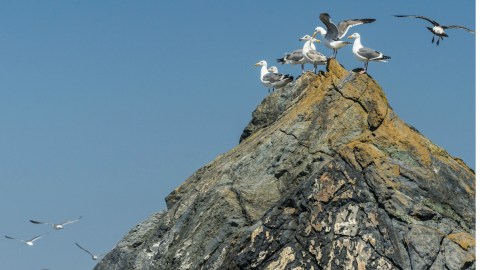Sixth Great Species Extinction Sees 70 Percent of Seabirds Die

If you want a vivid barometer for the health status of worldwide marine ecosystems, look no further than the global seabird population. You can think of species such as gulls, terns, pelicans, and albatrosses as biological scouts. They survey coasts across the world, playing fundamental roles in food chains both beneath the water and on land. If something has gone wrong in these ecosystems, the status of these birds will indicate as much. Unfortunately, new research estimates that the global seabird population has dropped 70 percent since the 1950s. To put it lightly, that’s not good.
Here’s how Science Daily summed it up:
“Michelle Paleczny, a UBC master’s student and researcher with the Sea Around Us project, and co-authors compiled information on more than 500 seabird populations from around the world, representing 19 percent of the global seabird population. They found overall populations had declined by 69.6 percent, equivalent to a loss of about 230 million birds in 60 years…
The dramatic decline is caused by a variety of factors including overfishing of the fish seabirds rely on for food, birds getting tangled in fishing gear, plastic and oil pollution, introduction of non-native predators to seabird colonies, destruction and changes to seabird habitat, and environmental and ecological changes caused by climate change…
Seabirds play an important role in those ecosystems. They eat and are eaten by a variety of other marine species. They also transport nutrients in their waste back to the coastal ecosystems in which they breed, helping to fertilize entire food webs.”
Zoinks. This is the first time a broad estimate has been reached via extended data ranging back 60 years. Paleczny’s conclusion is that world leaders need to step up their seabird-conservation efforts. This is not only because the birds themselves deserve to be protected, but also because dead birds likely means gaps in the food chain elsewhere. We depend on the reliability of these natural ecosystems. We need to make sure fish remain in the sea. We need certain seabirds to do away with natural pests that would thrive without them. It’s not just the birds that are threatened — it’s the dependable order of things as a whole.
You can read more about this particular study atScience Daily. For our purposes, I’ll point you to the video below. It features oceanographer, underwater explorer, and Big Think expert Sylvia Earle, who gives it to us straight: To neglect our oceans is to set ourselves up for dire consequences:
Photo credit: © Bobbushphoto / Getty





